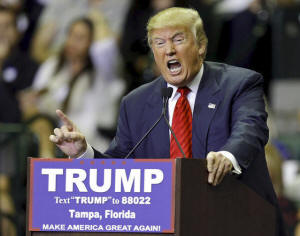|
For Chinese officials, Trump perhaps
better the devil they don't know
 Send a link to a friend
Send a link to a friend
 [July 12, 2016]
By Ben Blanchard [July 12, 2016]
By Ben Blanchard
BEIJING (Reuters) - In 2010, then Secretary
of State Hillary Clinton provoked outrage in Beijing when she pushed the
South China Sea to the top of the regional and U.S. security agendas.
Now as an international court prepares to hand down a ruling that
threatens China's sweeping claims in the vital waterway, Beijing is
watching Clinton's presidential run with trepidation.
Combined with her tough line on human rights and role in leading
President Barack Obama's Asia "rebalancing", Clinton is well-known in
China - but not well liked.
While presidential rival Donald Trump has irritated Beijing with
comments such as comparing the U.S. trade deficit with China to rape, he
is largely an unknown quantity, a person who even privately officials
shrug their shoulders over.
"Clinton will be a difficult partner," one senior Chinese diplomatic
source told Reuters, having just admitted to not knowing much about
Trump or what he stands for.
Chinese diplomats take some comfort that Clinton’s views are known to
them from years of high-level contacts, from her days as first lady to
her Senate tenure to her time as secretary of state. But they are also
mindful that even while seeking diplomatic accommodations, she has been
a staunch critic of Beijing on a range of issues, including the South
China Sea, trade and human rights.

China remembers clearly a 2010 Southeast Asian security summit in Hanoi,
when Clinton waded into the South China Sea dispute, saying open access
and legal solutions were a U.S. "national interest" and "pivotal to
regional security".
In a strongly worded response, China stressed the South China Sea as one
of its "core interests", putting the issue up there with Taiwan, Tibet
and Xinjiang in terms of its importance to Beijing.
China warned its rival claimants and neighbors not to be emboldened by
U.S. support - a line it has repeated ever since.
An arbitration court hearing the dispute between China and the
Philippines over the South China Sea is set to hand down its ruling on
in the Dutch city of The Hague on Tuesday. Legal experts expect at least
some substantive findings to go against China, which has vowed to ignore
the ruling.
STRENGTH, RESPECT
China's military, which is ramping up its presence in the South China
Sea as part of a major modernization program, is also watching the
election closely.
"Hillary is very fierce when it comes to China," a Chinese official
close to the military establishment told Reuters.
While the Chinese government has been largely quiet about the U.S.
election, state media has not been so restrained, with one paper even
equating Trump to Hitler.
In May, China's official Xinhua news agency noted Trump's more
isolationist campaign compared to Clinton's, who it described as an "old
foreign policy hand" and important backer of the Asia-Pacific "pivot"
that China considers a threat.
"As far as she's concerned, being tough on foreign policy is perhaps the
best way to show America's so called 'leadership'," it said in a
commentary.
Laura Rosenberger, a Clinton campaign foreign policy adviser who worked
with her in the State Department, told Reuters Clinton would remain
tough on the South China Sea issue.

"She believes that we need to be very strong in terms of standing up to
many of the actions the Chinese have taken," Rosenberger said.
"She believes in the principles of freedom of navigation in
international waters, that commerce on the high seas in incredibly
important to the United States, and that these are really very direct
interests that we need to continue to stand up for."
Trump adviser Peter Navarro, an economist at University of California
Irvine and the author of the book, "Crouching Tiger: What China's
Militarism Means for the World," said a Trump presidency would lead to
respect.
[to top of second column] |

Republican presidential candidate Donald Trump speaks during a
campaign stop in Tampa, Florida February 12, 2016. REUTERS/Mike
Carlson/File Photo

"The central difference between a Trump administration and the current
administration or a Clinton administration is respect. The leaders of
Russia, the leaders of China will respect Mr. Trump, will respect
America because we will be strong economically, militarily and
politically."
UNKNOWN QUANTITY
Trump may actually find some sympathy in China, even if he is seen as an
unknown quantity.
"Who is Trump? We don't really know. We do know he hates Muslims though
- and that will be well received in some circles here," said the Chinese
official with ties to the military, pointing to what China views as its
war on terror in its Muslim-populated far western region of Xinjiang.
China also views Trump as a businessmen with whom they can probably
negotiate.
"It would be very transactional for the Chinese," said a senior Western
diplomat in Beijing. "He's a businessman they think they'll be able to
strike a deal with."
Trump may also be less tough on China over human rights than Clinton,
who has frequently clashed with Beijing on the issue.
In 2011, Clinton said China was on a "fool's errand" to try to halt the
march of freedom, while in 2012 she was deeply involved in efforts to
get blind dissident Chen Guangcheng out of China after he fled to the
U.S. embassy in Beijing.
Trump advisor Navarro said Clinton's record on human rights abuse was
"sketchy at best and abysmal at worst", highlighting her first trip to
Asia as Secretary of State in 2009, where other issues were given
priority.
"So it's difficult to see how she would have someone would view her as
credible on that issue."

Rosenberger, the Clinton adviser, rejected that view, highlighting
comments from Trump in a 1990 interview referring to the "strength" of
the Chinese government in its bloody crackdown of student-led protests
in Tiananmen Square a year earlier.
“It’s ironic for Trump’s adviser to criticize Hillary’s statement there
when Trump himself has actually praised the Chinese for the Tiananmen
massacre,” Rosenberger said.
Still, China is hoping that whoever wins they will understand that both
countries need each other and will have to work closely, a source with
ties to the Chinese leadership told Reuters, requesting anonymity.
"It is the most important bilateral relationship in the world. China
needs the United States and vice versa," the source said. "We don't know
who will be the lesser of two evils."
(Additional reporting by Benjamin Kang Lim and Michael Martina in
Beijing, Greg Torode in Hong Kong, and Alana Wise, Caren Bohan David
Brunnstrom and Matt Spetalnick in Washington)
[© 2016 Thomson Reuters. All rights
reserved.]
Copyright 2016 Reuters. All rights reserved. This material may not be published,
broadcast, rewritten or redistributed.
 |